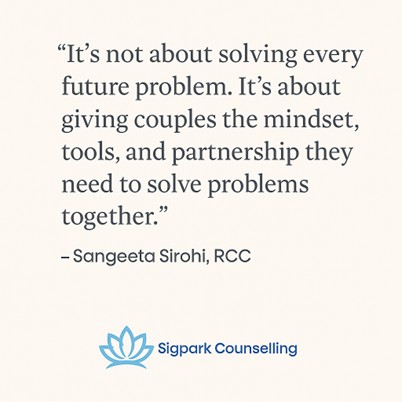Don’t Just Plan the Wedding—Prepare for the Marriage
The cake, the guest list, the photographer—you’ve probably thought about every detail of your wedding day. But how much time have you spent preparing for the decades that come after?
Premarital counselling is one of the smartest, most proactive investments you can make in your future together.
Not because something is wrong. But because you want it to go right.
While engagement is a joyful time, it’s also a major transition. You’re not just committing to love each other—you’re committing to build a life together. That means navigating finances, family expectations, communication styles, and different ways of coping with stress or conflict. These conversations matter. And having them early, with the support of a trained therapist, helps you build a strong foundation that lasts long after the honeymoon ends.
“The best time to address challenges in a relationship is before they become patterns. Premarital counselling helps couples set up healthy habits from the start.”
– Sangeeta Sirohi, RCC, Founder of Sigpark Counselling
Research supports this. A comprehensive study from the Journal of Family Psychology found that couples who participated in premarital counselling were 31% less likely to divorce than those who didn’t.
(Source, APA PsycNet)
In this blog, we’ll explore:
- What premarital counselling actually looks like
- The most common topics couples cover
- Why even happy couples benefit from it
- And how Sigpark Counselling supports engaged couples in Vancouver and across BC
If you’re ready to build a marriage that’s just as strong as your wedding plans, this guide is for you.
Why Premarital Counselling Is So Valuable
Most couples enter marriage with love, commitment, and a shared vision for the future. But even the strongest relationships can be challenged by miscommunication, stress, and unmet expectations—especially when they haven’t been talked through ahead of time.
That’s where premarital counselling comes in.
“Too often, couples wait until they’re in distress to seek help. Premarital therapy gives couples a head start—by helping them navigate emotional, financial, and relational differences before they become sources of long-term conflict.”
– Sangeeta Sirohi, RCC, Founder of Sigpark Counselling
This isn’t about “fixing” your relationship—it’s about strengthening it with the same care and intention you’re putting into your wedding plans.
The Real Benefits of Premarital Counselling
The numbers speak for themselves: in one meta-analysis, couples who completed premarital counselling were about 31% less likely to divorce than those who didn’t . Another large survey showed that couples who received premarital education reported higher satisfaction and commitment, with significantly lower odds of divorce. That’s a real impact backed by serious research.
Here’s why it works:
- You uncover hidden assumptions.
Most couples don’t realise how differently they view things like money, parenting, or in-laws until a conflict happens. Counselling gives you space to explore these topics before they become pressure points. - You learn to navigate conflict with respect.
Premarital counselling equips you with communication tools, emotional regulation strategies, and a shared understanding of how to work through differences productively. - You build emotional safety early.
Being vulnerable is easier when there’s a neutral, non-judgmental space to do it. A trained therapist can help you have hard conversations with compassion and clarity. - You develop a shared framework.
Rather than reacting in the moment, couples leave counselling with an agreed-upon plan for handling stress, family boundaries, finances, and future goals.
What You’ll Talk About in Premarital Counselling
You’re not signing up for a lecture—you’re opening the door to conversations that matter. Premarital counselling isn’t just a checklist of awkward topics. It’s a guided space where you and your partner learn how to listen, speak, and plan as a team.
Each therapist’s approach may vary slightly, but here are the most common areas explored during sessions:
Communication Styles
Do you shut down during conflict while your partner needs to talk things out? Do you both default to sarcasm or get defensive without realising it?
You’ll learn to:
- Identify your communication styles
- Interrupt negative cycles (like criticism or withdrawal)
- Use tools like “I” statements and active listening
Therapists may draw from techniques like The Gottman Method, which helps couples de-escalate tension and rebuild connection during conflict.
Money and Financial Beliefs
Money is one of the top sources of marital tension. But the issue often isn’t the budget—it’s the beliefs and emotions behind it.
Topics might include:
- Spending and saving habits
- Financial roles and responsibilities
- Long-term goals like home ownership or retirement
According to a study by SunTrust Bank, finances are the leading cause of stress in relationships, with 35% of couples citing money as their main conflict.
Family and Parenting Expectations
Whether you plan to have children or not, it’s important to clarify your values around parenting, discipline, work-life balance, and extended family boundaries.
You might discuss:
- How you were each raised and what you want to emulate or change
- Cultural or religious traditions
- Parenting timelines or fertility concerns
This is especially valuable if you come from different cultural, religious, or socioeconomic backgrounds.
Sex and Intimacy
Yes, this comes up too—but not in a clinical or awkward way. It’s about exploring:
- Love languages
- Emotional connection vs. physical needs
- Frequency, preferences, and expectations
Premarital counselling helps you align emotionally and physically so both partners feel seen and valued.
Goals, Roles, and the Big Picture
You’re building a life together. That life has timelines, dreams, dealbreakers, and compromises.
You’ll discuss:
- Career plans
- Geographic location
- Family planning
- Division of responsibilities
The goal isn’t to have all the answers—it’s to know how to approach the questions together.

Common Myths About Premarital Counselling
Premarital counselling has come a long way from being seen as a “last step before the altar.” Today, it’s widely recommended by therapists, marriage educators, and even financial planners.
Still, some myths persist—and they keep many couples from taking advantage of this powerful resource.
Let’s clear those up.

Myth 1: “We don’t need counselling—we already get along.”
It’s great that you’re not in crisis. That’s actually the best time to start.
Premarital counselling isn’t about fixing problems. It’s about building strong foundations and learning how to navigate challenges before they happen.
According to The Gottman Institute, couples who develop conflict resolution skills early are far more likely to maintain satisfaction during high-stress seasons (like having kids, moving, or career shifts).
Myth 2: “It’s only for religious or traditional couples.”
While some faith-based programs include premarital sessions, counselling today is secular, flexible, and inclusive.
At Sigpark Counselling, we work with:
- Secular couples
- LGBTQIA2S+ couples
- Intercultural partnerships
- Second marriages or blended families
The process is always adapted to your values, not anyone else’s.
Myth 3: “It’ll be awkward or judgmental.”
A good therapist doesn’t lecture or play referee. Instead, they:
- Guide thoughtful conversation
- Create a neutral, respectful environment
- Help each partner feel heard, not blamed
“Counselling isn’t about pointing out your flaws. It’s about creating a safe place to grow together—on your terms.”
– Sangeeta Sirohi, RCC
Myth 4: “We’ll just figure it out after the wedding.”
You probably wouldn’t wait until your house is flooding to buy a plunger. Marriage is no different.
Addressing expectations around finances, in-laws, intimacy, and roles before the vows can help you avoid deeper conflict later—and give you a clear plan for working through the tough stuff when it comes.
How Counselling Builds a Foundation for Long-Term Success
Getting married is easy. Staying married—happily, healthily, and with mutual respect—takes a solid foundation.
That’s where premarital counselling shines.
It’s not just about avoiding divorce. It’s about learning how to stay connected during life’s inevitable storms. Think of counselling as relationship training: the emotional fitness plan that helps you handle stress, disagreement, and growth—together.
Communication that Actually Works
It’s no secret that communication is the #1 issue in most relationships. But here’s what most couples get wrong:
They think good communication means talking more. What it really means is listening better, responding with care, and learning how to approach tension without defensiveness.
In premarital counselling, you learn how to:
- Recognize your conflict style (withdrawal, escalation, blame)
- Use timeouts and repair statements
- Speak to be heard—without triggering shutdown or pushback
📚 Want to learn more about improving how you talk through conflict? Check out this blog post on managing different parenting styles from Sigpark Counselling.
Expectation Alignment
It’s easy to assume you’re on the same page—until one of you wants four kids and the other’s not sure about even one. Or until finances come up. Or family dynamics get in the mix.
A big part of premarital counselling is making the unspoken spoken—about money, roles, intimacy, holidays, career paths, and more.
According to research published in the Journal of Family Psychology, couples who go through structured premarital counselling report significantly higher satisfaction in their early years of marriage and are 31% less likely to divorce than those who don’t.
📊 Source: APA PsycNet Meta-Analysis Summary

Conflict Resolution You Can Actually Use
It’s not about having zero fights. It’s about learning how to fight fair.
In counselling, you’ll explore proven tools like:
- The “soft startup” technique from the Gottman Method
- De-escalation skills from Emotionally Focused Therapy (EFT)
- Reframing conflict as shared problem-solving
These techniques aren’t just theory. A 2020 study from the Journal of Marital and Family Therapy found that couples using EFT techniques showed sustained improvements in trust and emotional closeness, even 12 months after therapy ended.
📚 Read more: Journal of Marital and Family Therapy Study Abstract
Teamwork Over Time
The real goal? Building a sense of shared identity and resilience.
Premarital therapy helps couples develop:
- A “we” mindset instead of “you vs. me”
- Clarity about shared goals
- Confidence in how to handle challenges together
As Sangeeta Sirohi, RCC and Founder of Sigpark Counselling, explains:
“It’s not about solving every future problem. It’s about giving couples the mindset, tools, and partnership they need to solve problems together.”
What to Expect in a Premarital Counselling Session
If you’ve never been to therapy before, you might wonder what actually happens in a premarital counselling session. Spoiler: it’s not awkward, and it’s definitely not about pointing fingers.
At Sigpark Counselling, the experience is designed to feel collaborative, thoughtful, and personalized to your relationship—not like a generic worksheet or one-size-fits-all checklist.
Here’s what most couples can expect:

A Calm, Confidential Space to Talk Openly
Your therapist creates a neutral, supportive environment where both partners feel equally heard. You’ll be encouraged to explore sensitive topics with honesty, curiosity, and respect—without judgment or pressure.
If you’re doing virtual sessions, you’ll receive the same level of connection and structure, just from the comfort of your own home. (And yes, virtual premarital counselling works just as well.)
A Structured, But Flexible Process
Premarital counselling typically begins with a few intake questions about your history, values, and relationship strengths. From there, each session may explore topics like:
- Conflict patterns and communication habits
- Differences in family upbringing or traditions
- Financial planning styles and decision-making
- Sex, intimacy, and emotional closeness
- Shared goals and how to support each other’s dreams
- What a supportive partnership looks like day to day
Sessions can be booked as a short-term series (e.g. 3–6 sessions) or integrated into a longer-term relationship counselling plan, depending on your needs.
Practical Tools, Not Just Conversations
Yes, you’ll talk—but you’ll also learn concrete skills you can use in real life:
- How to de-escalate arguments
- How to navigate differences without resentment
- How to build shared rituals for connection
- How to stay emotionally attuned during stress
Think of this as emotional preparation for life’s less romantic seasons—when you’re managing finances, raising kids, dealing with loss, or making big decisions.
Premarital sessions at Sigpark are inclusive of all relationship types and cultural backgrounds. Whether you’re preparing for your first marriage, a second union, or blending families, our work is rooted in empathy, curiosity, and care.
👉 Ready to find out if premarital therapy is right for you? Book a free 15-minute consultation to learn more about the process and ask any questions you might have.
Conclusion: Your Marriage Deserves More Than Just a Wedding Plan
You’ve spent time choosing the perfect venue, curating a guest list, and planning your honeymoon. But here’s a question: Have you prepared for what comes after the celebration?
Premarital counselling isn’t about fixing a broken relationship—it’s about investing in a strong one. It gives you the space, tools, and clarity to build something lasting—not just beautiful for a day, but grounded for a lifetime.
You don’t need to have all the answers. You just need a willingness to talk, listen, and grow together.
Whether you’re navigating money conversations, blending families, or simply want to strengthen your bond before marriage, Sigpark Counselling is here to support you.
“The strongest relationships aren’t the ones without conflict. They’re the ones where both partners know how to reconnect, even when things get hard.”
– Sangeeta Sirohi, RCC
💬 Ready to start building your future—together?
Book your free 15-minute consultation with Sigpark Counselling today.
We’ll walk you through the process, answer your questions, and help you lay the foundation for the kind of marriage you’ve always hoped for.

